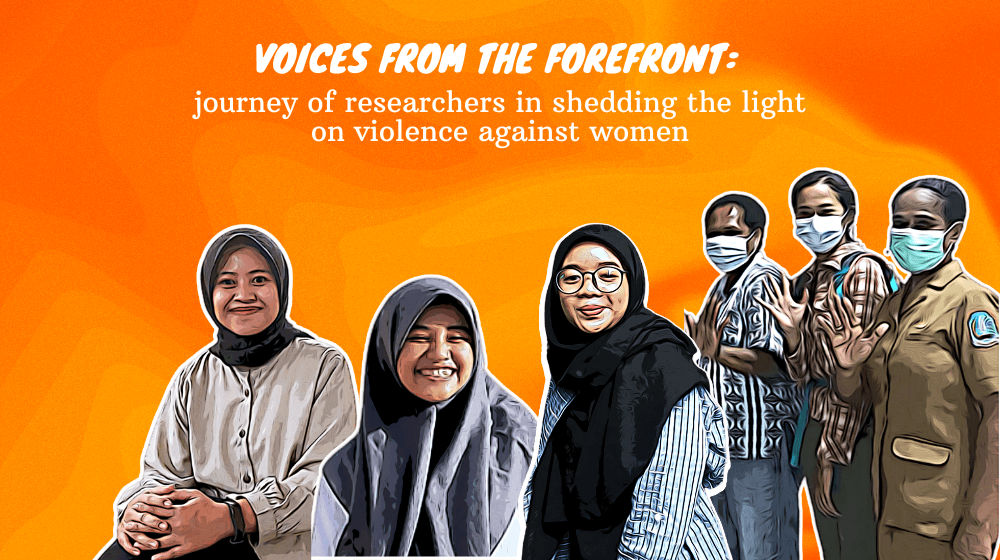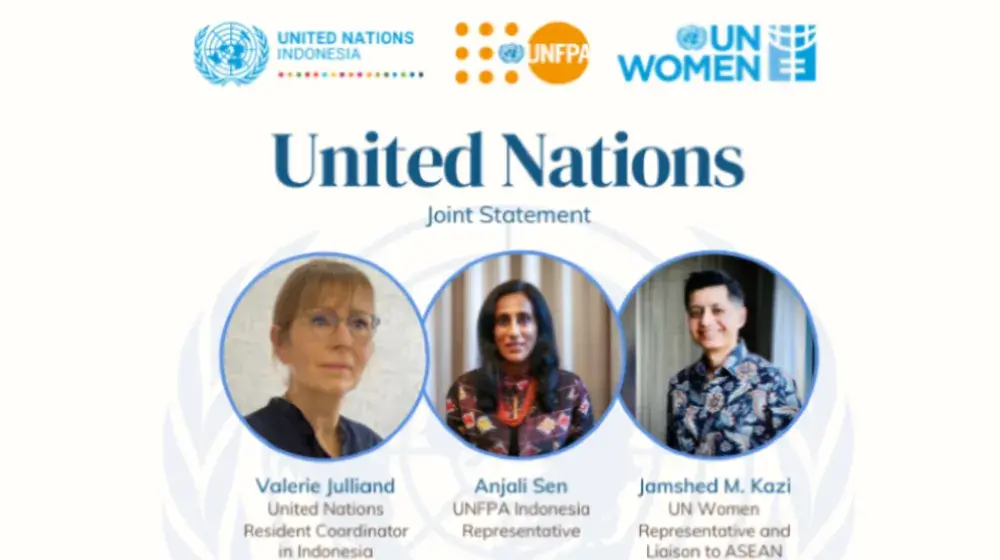“I learned that it took a long time and process for victims and survivors of gender-based violence to realize that they had experienced violence,” said Risda Dewi Sartika, a researcher in Jakarta who was involved in the 2021 National Women’s Life Experience Survey (SPHPN 2021).
She found the experience eye opening, helping her to understand violence against women (VAW) better.
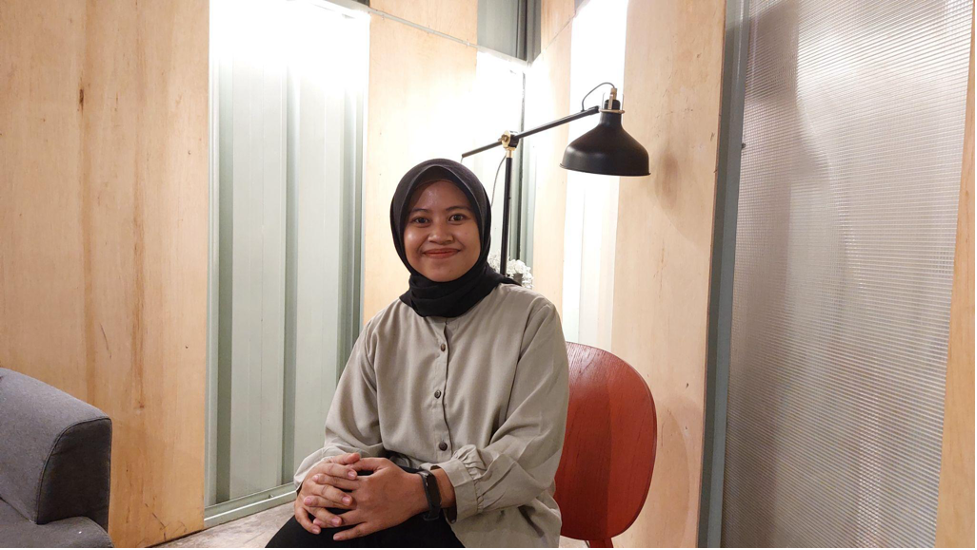
© Personal Documentation
Information is power. The power of data on gender-based violence (GBV) informs policy makers, civil society organisations (CSOs), activists and women’s rights organisations in developing better policies and programmes to effectively address GBV, including VAW.
UNFPA has supported the Ministry of Women’s Empowerment and Child Protection (KemenPPPA), BPS - Statistics Indonesia, and the Demographic Institute of University of Indonesia’s Faculty of Economics and Business (LD FEB UI) in conducting SPHPN, as part of Indonesia's commitment to ending GBV.
SPHPN, also known as the VAW survey, provides data that reveal the prevalence of GBV experienced by women aged 15-64 in Indonesia. The national survey uses an approach developed by the World Health Organization (WHO), sampling a total of 12,800 women across Indonesia in 2021.
Four SPHPN researchers and enumerators shared their perspectives and experiences in collecting data for the second SPHPN in 2021. Alberta Prabarani, Risda Dewi Sartika, Rahma Syahira, and Putri Desifa Ritonga (Sifa) interviewed women and girls from various provinces in Indonesia, including Medan, North Sumatra, Greater Jakarta, and Papua.
Beyond numbers
In most cases, GBV is systemic and hidden. Violence often happens in private spaces. When taking place in public, many are reluctant to intervene due to social norms. These harmful social norms and practices often become barriers for victims to speak up and receive help when experiencing violence. As a result, GBV has become normalized and women and girls in parts of Indonesia often endure prolonged violence in silence.
Thus, interviewing women and girls about GBV is not an easy task. Understanding the sensitivity and the risks, the survey organizers equipped the enumerators with intensive training before the data collection process.
Rahma, an enumerator in North Sumatra, found that the training was really helpful in improving her awareness on the violence that women around her experience.
“I did not realize that the incidents shared during the training actually also took place where I live. Only after following the process of data collection of SPHPN did I finally know that incidents like these (violence against women) also happen in North Sumatra, even in places very close to me,” Rahma said.
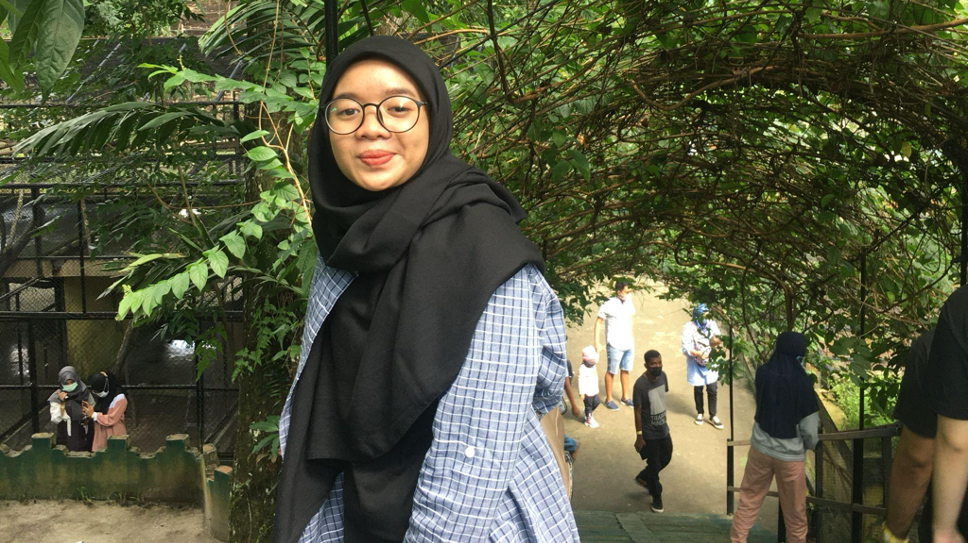
said Rahma Syahira, an enumerator from North Sumatra.
© Personal Documentation
Similarly, for Sifa, participating in the SPHPN process has helped her to understand GBV better. “The experience of women and girls who face violence, abuse, and harassment are much closer to us in our everyday life than we realize. By participating in the survey, I now have a better understanding about violence against women and girls,” Sifa said. “Because of SPHPN, I realize that there is a place for women and girls to share their experience, especially related to violence.”
The data gathered through SPHPN 2021 revealed that 1 in 4 women and girls aged 15-64 years have experienced physical and/or sexual violence perpetrated by either their partner or non-partner in their lifetime. Beyond numbers, the survey also found physical, sexual, emotional and economic violence by both intimate and non-intimate partners to be the most common types of violence experienced by women and girls.
Safety first
Interviewing women about their life experiences is challenging, especially since the survey intends to reveal the vulnerability of women and girls to violence in their everyday life. What makes it extra challenging is that in many GBV cases, the perpetrators are the people close to the victims such as their intimate partners and family members. In this context, data collection can be risky both for the respondents and the enumerators.
“There was a moment when I was just wrapping up an interview with a respondent, and she was crying. And then all of a sudden, her husband showed up looking suspicious, which made us feel intimidated,” Rahma recalled.
As a woman, Rahma was more worried about the risk and situation that the respondent was facing than about her own safety. She admitted that she felt hopeless because she could not help beyond sharing hotline service information for the respondents to contact if they needed help.
The situation that Rahma faced was pretty common among the SPHPN enumerators. It put them in a dilemmatic position because despite knowing that their respondents are GBV victims, they could not do anything to intervene. Hence, to ensure safety of the enumerators and respondents of SPHPN, a response plan was developed to ensure victims of violence receive support and GBV services should they experience violence through GBV referral mechanism.
In other cases, hearing other people’s similar experiences can also pose risks for survivors. One enumerator admitted that interviewing the respondents triggered her trauma from a past violent experience.
To ensure the safety of enumerators, UNFPA collaborates with Pulih Foundation to provide enumerators with psychosocial support services during the data collection process. The enumerator who had the triggering experience felt that she benefited from having psychosocial support.
During the training, the enumerators were also equipped with a list of GBV services, including a hotline, to support women and girls who disclosed their experience of violence and needed support. The list was designed in a way that made it safe to be handed to the respondents after the interview.
Changed perspectives and a hopeful future
Despite the limitations and challenges they faced during the data collection, the enumerators found the SPHPN experience rewarding and enlightening. Being involved in SPHPN changed their perspectives and shaped their understanding of GBV and VAW.
Alberta, a qualitative researcher in Jayapura city and district, was inspired by the persistence of the GBV survivors she met in reclaiming their lives.
“GBV survivors are strong. Many of them have found ways to survive such as by running small businesses and selling food. They have gradually regained independence without having to rely on their former husbands who are perpetrators of domestic violence,” Alberta, who interviewed respondents who have mostly started to recover from physical and emotional trauma, elaborated. “Thus, support from families, local community, local government, and church are very important for the recovery [of victims].”
Alberta also added that the local government, particularly, District Office of Women’s Empowerment and Child Protection (DP3A), plays important roles in supporting GBV victims in support and seeking justice.
“The role of DP3A was very important for them as a support system. They were listened to, and provided with safe spaces and other important services such as medical and legal support,” she said.
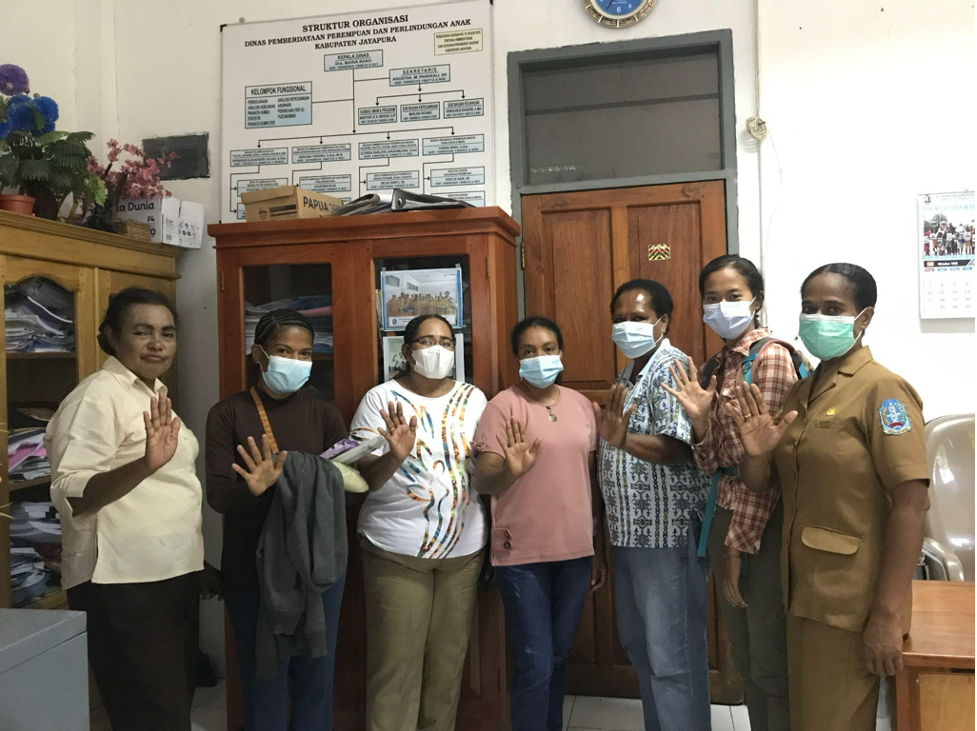
said Alberta (second from right), enumerator in Jayapura City and District.
© Personal Documentation
Risda agreed that GBV services are key to the recovery of GBV victims. “In my observation, GBV services hold an important role for victims. Support should always be accessible for GBV victims whenever they need it, including in special situations like the COVID-19 pandemic.”
Alberta, Risda, Rahma, and Sifa are hopeful that with the reality that they captured for SPHPN, they can make a difference and contribute to shaping a bright future where women and girls live with dignity, free from violence and discrimination.

said Sifa, enumerator from Serdang Bedagai district and Medan city.
© Personal Documentation
“I believe that we can achieve the ultimate goal of ending gender-based violence through the realization of gender equality for all,” Alberta said wistfully. “I also realize that this is a major homework for us, which will take a long time to complete, especially since we live in a patriarchal society.”
UNFPA continues to support KemenPPPA, BPS-Statistics Indonesia, and LD FEB UI in producing and using data and research on the prevalence of violence against women. This provides a strong foundation for evidence-based policy making to address GBV and harmful practices (female genital mutilation/cutting) in Indonesia.
- Risya A. Kori, Gender Programme Specialist
- Cresti Eka Fitriana, Youth Engagement Focal Point for Gender Programme

